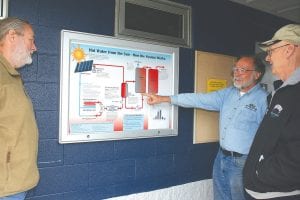This summer marks the third season of operation for the solar hot water system installed on Bathhouse No. 4 in the Grand Marais Recreation Park. Citizens have asked—how has it been performing? Have the five solar hot water panels made a difference by saving energy and money and reducing CO2 emissions?
Cook County Local Energy Project (CCLEP) board member and project leader Don Grant said it’s performing great and he replied yes, the system is saving money. As part of the project, Grant is monitoring both the temperature of liquid in the panels and the rate of water usage for the first five years of operation. He has collected two years worth of data that will be delivered to the Grand Marais Park Board.
The result is a savings of 4741 kWh in 2011 that increased to 5586 kWh in 2012. This is a savings of $602 in 2011 and $709 in 2012 for a total of $1,312 for both years. This is a reduction in CO2 emissions by 11.9 tons during the camping season for both years.
The system has also had a significant reduction in “no hot water” complaints that was the case before the solar panels were installed. “The bottom line”, said Park Manager Dave Tersteeg, “is to keep us in hot water on a Saturday and it’s doing that!”
During the past two years, the only complaints were on foggy days. Previously, two commercial electric water heaters that were not always able to meet demand heated the water in the bathhouse. Now they are used as back up heaters. Peak demand is during the months of July and August when there is usually a lot of sunlight.
Do the panels produce hot water in the winter and what happens to the heat? The liquid in the panels is heated whenever the sun shines on them. Since the bathhouse is shut down at the end of the camping season, the heat generated by the panels is diverted to radiators in the ceiling of the mechanical room in the bathhouse. This heats the room.
The five-panel system is a CCLEP project that was funded by grants from Clean Energy Resource Teams (CERTS) and the Laura Jane Musner Fund. The grants totaled $12,500 that paid for panel and installation costs, the pumps, monitors and heat exchanger storage tanks as well as two signs explaining the systems that are by each entry door. The public is invited to visit and take a look.
Locally, Como Oil and Propane does solar hot water installations and North House Folk School offers system installation classes from time to time.



Leave a Reply